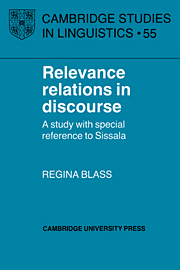Book contents
- Frontmatter
- Contents
- Acknowledgements
- List of abbreviations and symbols
- Maps
- Introduction
- 1 What is discourse?
- 2 Relevance theory and discourse
- 3 The interpretive-use marker rέ
- 4 Constraints on relevance and particle typology
- 5 Baa: truth-conditional or non-truth-conditional particle?
- 6 Defining in Sissala
- 7 Meanings and domains of universal quantification
- 8 Co-ordination and stylistic effects
- Notes
- References
- Index
6 - Defining in Sissala
Published online by Cambridge University Press: 02 December 2009
- Frontmatter
- Contents
- Acknowledgements
- List of abbreviations and symbols
- Maps
- Introduction
- 1 What is discourse?
- 2 Relevance theory and discourse
- 3 The interpretive-use marker rέ
- 4 Constraints on relevance and particle typology
- 5 Baa: truth-conditional or non-truth-conditional particle?
- 6 Defining in Sissala
- 7 Meanings and domains of universal quantification
- 8 Co-ordination and stylistic effects
- Notes
- References
- Index
Summary
Introduction
Every language with referential expressions seems to have some means of indicating to hearers not only that a referent of a certain type is required, but also where to search for appropriate referents, and how easily accessible they are. Within the framework of relevance theory, such expressions, in at least some of their uses, should be analysable as semantic constraints on relevance, contributing not to truth-conditional content but to reducing the hearer's processing load. In this chapter, I will look briefly at some Sissala data of this general type.
It has long been thought that defining expressions – determiners – play an important role in this aspect of processing (see Clark and Clark 1977:466–7; Clark and Marshall 1981; Hawkins 1978; Nunberg 1977). Thus, according to Hawkins a speaker using a definite article has the following in mind:
a. He introduces a referent (or referents) to the hearer.
b. He instructs the hearer to locate the referent in some shared set of objects.
c. He refers to the totality of the objects or mass within this set that satisfy the referring expression. (1978:125)
In English, a noun phrase containing the indefinite article a(n) can be used with specific or non-specific reference. Either can be the basis for further definite reference. Thus in an example like (1)
A colleague of mine has just given me a call,
the speaker might have wanted either to introduce a specific colleague or just to introduce the referent in a non-specific way.
Information
- Type
- Chapter
- Information
- Relevance Relations in DiscourseA Study with Special Reference to Sissala, pp. 183 - 201Publisher: Cambridge University PressPrint publication year: 1990
